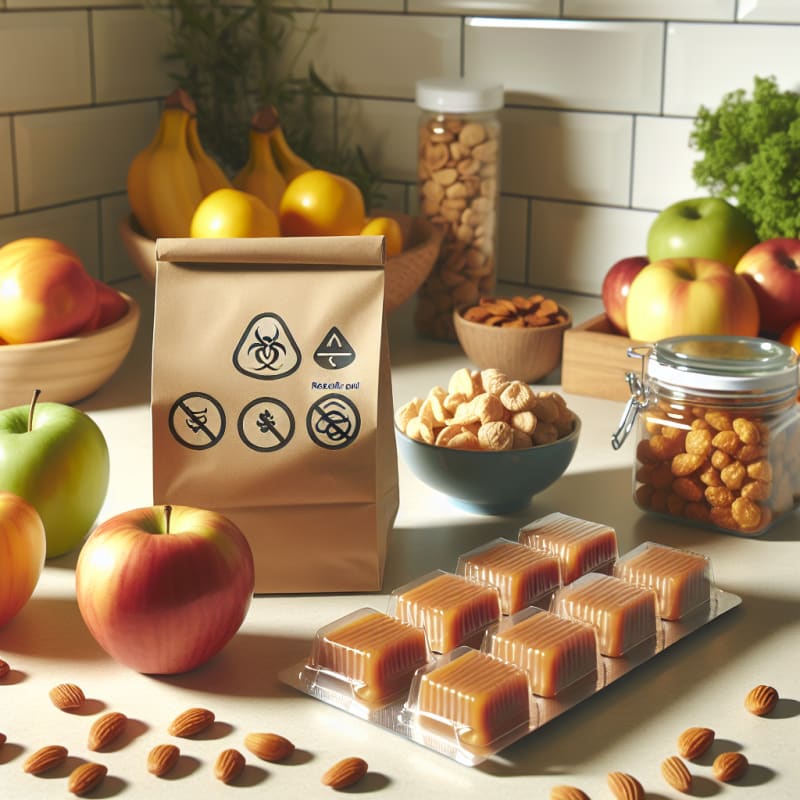Caramel Recall: Threat-to-Life Warning Issued – What You Need to Know
Food safety alerts are a growing concern for consumers, especially those with food sensitivities, allergies, or strict dietary preferences. In June 2024, a threat-to-life recall was issued for certain caramel products, highlighting the importance of vigilance when choosing packaged foods. This article breaks down the recent recall, explains its broader significance, and offers actionable tips to help you make safer, smarter food choices every day.
What Happened? The Caramel Recall Explained
According to a Newsweek report, a popular caramel candy brand was recalled after it was found to contain a potentially life-threatening contaminant. The recall was initiated after several adverse reactions were reported, prompting authorities to issue a nationwide warning.
| Recall Details | Information |
|---|---|
| Product | Caramel candies (brand and batch details per FDA notice) |
| Reason | Possible contamination with undeclared allergen or harmful substance |
| Issued by | U.S. Food and Drug Administration (FDA) |
| Risk Level | Threat-to-life (severe allergic reactions, hospitalization risk) |
| Date | June 2024 |
For the latest updates and a full list of affected products, visit the FDA recall database.
Why Are Food Recalls Increasing?
Food recalls have become more frequent due to:
- Improved detection of contaminants and allergens
- Stricter regulations by agencies like the FDA (U.S.) and EFSA (Europe)
- Complex supply chains increasing the risk of cross-contamination
According to the CDC, food recalls are critical for preventing illness and saving lives, especially for those with severe allergies or compromised immune systems[1].
Who Is Most at Risk?
- Individuals with food allergies (e.g., nuts, dairy, soy)
- People with food intolerances (e.g., lactose, gluten)
- Those following special diets (e.g., vegan, keto, kosher, halal)
- Children, elderly, and immunocompromised individuals
Undeclared allergens are a leading cause of food recalls in both the U.S. and Europe[2]. Even trace amounts can trigger severe reactions, making accurate labeling and rapid recalls essential.
How Are Recalls Managed?
Both the FDA and the EFSA play key roles in monitoring, investigating, and managing food recalls. When a threat is identified:
- The product is immediately withdrawn from shelves.
- Public warnings are issued through news outlets and official websites.
- Consumers are advised to return or dispose of affected products.
- Manufacturers may face investigations and stricter future oversight.
Recent news from CNN and Food Safety News highlights the urgency and seriousness of such recalls.
What Should You Do If You Have an Affected Product?
- Check the batch number and expiration date against official recall notices.
- Do not consume the product, even if it looks or smells normal.
- Return or dispose of the product according to recall instructions.
- Contact your healthcare provider if you experience symptoms of an allergic reaction (hives, difficulty breathing, swelling).
How to Stay Informed and Safe: Food Scan Genius App
Food Scan Genius is an app designed to help consumers with food sensitivities, allergies, or dietary preferences make safer choices. By scanning barcodes or searching product information, users can:
- Get instant alerts on recalls and ingredient risks
- Check for allergens and dietary compatibility (vegan, keto, gluten-free, etc.)
- Access up-to-date food safety news and regulations
“I have a severe nut allergy, and Food Scan Genius has been a lifesaver. It notified me about the caramel recall before I even heard it on the news. I feel so much safer shopping now!” – Jessica R., Food Scan Genius user
Download Food Scan Genius to protect yourself and your family from hidden food risks.
Broader Implications: Why Ingredient Transparency Matters
This recall is part of a larger trend toward ingredient transparency and consumer empowerment. As more people adopt specialized diets or manage food allergies, the demand for clear labeling and rapid recall notifications grows. New regulations, like the Food Allergen Labeling and Consumer Protection Act (FALCPA), are helping—but technology and consumer awareness remain crucial.
Recent Developments in Food Safety & Trends
- Plant-based and keto products are rising, but may have new allergens or additives[3].
- Labeling laws are being updated globally to require more detailed ingredient lists[4].
- Sustainability and ethical sourcing are influencing brand reformulations[5].
Staying informed about recalls and ingredient changes is essential for everyone, but especially for those with food sensitivities or ethical concerns.
Frequently Asked Questions
What should I do if I have a recalled caramel product?
Do not eat it. Check the recall notice for batch numbers, return it to the store, or dispose of it safely. If you have symptoms of an allergic reaction, seek medical help immediately.
How can I stay updated on food recalls?
Use apps like Food Scan Genius, follow FDA and EFSA recall alerts, and subscribe to food safety news sources.
Why are food recalls becoming more common?
Better detection, stricter regulations, and complex supply chains increase the likelihood of identifying contamination or labeling issues.
What are the long-term implications of frequent food recalls?
They drive improvements in food safety, transparency, and technology, making it easier for consumers to make informed choices and for brands to ensure safety.
Conclusion: Make Ingredient Awareness Your Superpower
Food recalls like the recent caramel incident are a reminder that ingredient vigilance saves lives. Whether you’re managing allergies, following a special diet, or simply want to eat smarter, staying informed is your best defense. Downloading Food Scan Genius puts real-time safety alerts and ingredient analysis in your pocket—helping you shop, eat, and live with confidence.
References:
- CDC: Food Recalls
- PubMed: Food Allergen Recalls
- PubMed: Emerging Food Trends and Allergens
- EFSA: Food Allergen Regulations
- FDA: FALCPA
- Food Safety News: Caramel Recall
- Newsweek: Caramel Recall Threat-to-Life Warning
- CNN: Candy Recall Allergen Warning





